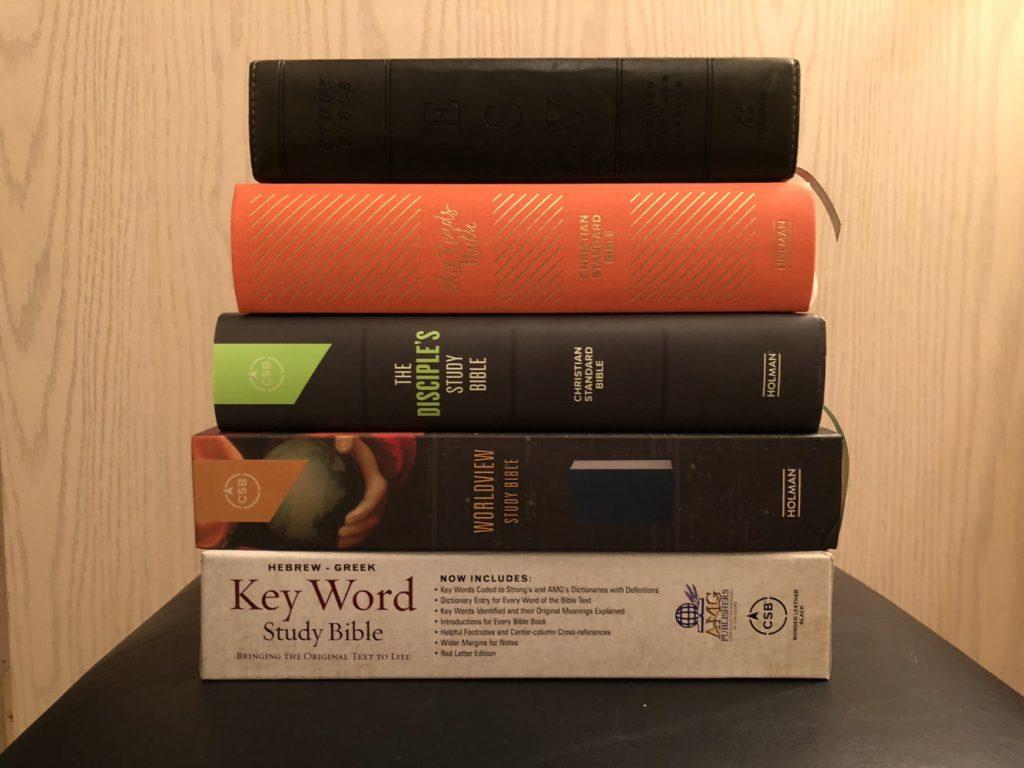Have you ever had to juggle multiple things in life? If you’re like most of us, the answer is yes. Life is a balancing act we all play at some point in our lives, if not our entire lives. But, what do you do when that juggling act becomes necessary in your Bible study? How do you handle multiple Bible studies at once? This is the very question Bible Study Tips reader Dominique asked me recently. Here’s what she wanted to know:
This year I planned to read the entire bible in a year. So far I’ve stuck with it and I’m currently reading through Ezekiel! When I’m reading, I just pull out my CSB She Reads Truth Bible or my CSB Reader’s Bible and read from those. But at what point do I actually start studying a book of the Bible more in-depth? Reading and meditating is good, but I want to actually study something.
I don’t know if it would be too much to continue with my reading plan and study a particular book of the Bible at the same time. I don’t want to get overwhelmed! Do you have any suggestions?
Dominique’s question is fantastic and one that many of us struggle with. So, in addition to having personally replied to her email, I thought her question would make a great Bible study tip. With that in mind, this week we’ll look at how to juggle multiple Bible studies and readings.
Bible Reading is Still Bible Study
Before I get into the details of juggling multiple Bible studies, I want to make something clear: Bible study takes many forms and shapes. Simply reading the Bible is just as much “Bible study” as an in-depth verse-by-verse study. Not everything needs to be an in-depth and higher level. Sometimes we take the lighter studies for granted, not realizing there is much we can glean from them as well.
A balance between them all is the best approach. The first time I read through the Bible was amazing because it gave me a greater understanding of the overarching meta narrative & how everything fit together. All I did was read the Bible, but I learned so much that I would not have gotten any other way. Yet, in the same way, when I studied 1 Thessalonians verse-by-verse, it was just as fruitful, but in a different way. Both were Bible study, and both grew my faith.
Don’t fall for the lie that Bible reading is not Bible study. It is; and, you can and will still learn, if you approach it with a heart to commune with God.
Now, let’s talk about juggling.
Bible study takes many forms and shapes. Simply reading the Bible is just as much “Bible study” as an in-depth verse-by-verse study. Share on XHow to Juggle Multiple Bible Studies
There are many reasons why someone might need or want to juggle multiple Bible studies at time same time. For instance, they might be part of a Bible study group at their church or school. They already have their own study they don’t want to abandon, but they also want to participate in the group. Maybe they have multiple interests and want to tackle them together. The reasons are endless. Personally, I’ve done it recreationally, as a member of a discipleship group, a Bible study book club, and for church reasons.
At first glance, juggling multiple Bible studies at once might seem like a daunting task. But, let me tell you, it is more than possible. As a matter of fact, you can even flourish while doing so. That said, here are a handful of ways you can manage multiple studies without losing your mind or giving up.
1. Dig Deeper in Your Current Reading
Let’s say you have a Bible reading plan and you also want to do something more in-depth, like Dominique. Well, you don’t necessarily need to add another study to your plate. There are many ways you can go deeper with what you’re already reading. You may not go on a verse-by-verse level with a study, but you can utilize tools that we’ve mentioned before to dig deeper. Here are some ideas:
- Use the Seven Arrows method to digest the passage
- Find a word or two and do a word study and use your concordance.
- Journal your findings in a H.E.A.R. Journal
- Do a simple cross-reference study based on key passages in your reading
Each of these are easy ways to dig deeper into a Bible reading plan without adding a completely different study to your plate. Plus, this allows you the freedom and flexibility to try different study methods in addition to your reading. Avoid juggling multiple Bible studies altogether.
There are lots of easy ways to dig deeper into Bible study with a Bible reading plan. Use simple Bible study methods and dive in! Share on X2. Double Up to Free Up
Now, if you must add another study, there are simple ways to do it without abandoning your current plan. Again, let’s assume you already have a Bible reading plan and you need to add an additional study. This method involves increasing your Bible reading once or twice a week to make room for your other Bible study.
One of the easiest ways to carve out a day or two for an additional study is to double up on your Bible reading for a couple days. For example, if you have a 365 day reading plan, you can do two days worth of reading twice a week. This then frees up two days for your other Bible study. The additional workload twice a week is fairly minimal, if your schedule allows for it.
This is the option I recommended to Dominique.
3. Extend Your Plan
Sticking with the same scenario of tackling a Bible reading plan and adding another study, there is a second option. Instead of doubling up your reading, you can extend the length of your plan. Figure out how many days a week you need for your additional study. Block out those days on your schedule. Then skip your Bible reading on those days and do your study. Then, on your reading plan days, just continue with the next day’s reading. Yes, it will take you longer to finish your reading plan, but it’s a great option if you do not have time to squeeze in an additional reading or two during the week.
4. Go With Your Interests
I personally juggle multiple studies all the time, but I usually don’t have a set time when they need to be completed. So, my method of attack is studying whatever is most interesting or urgent in the moment. For example, I’m currently studying both James and 2 Thessalonians verse-by-verse, along with my daily reading plan (F-260). I don’t have time for James or 2 Thessalonians every day, but when I do have time to study for an extended period of time, I’ll pick the one that piques my interest in the moment or want to make progress in.
If you are not bound by a schedule for your studies, this is a great option.
I also use this method when reading books. At any given time I’m reading 5 or 6 books. I bounce between them based on time, interest, and attention span. The same can work for your Bible study.
5. Split Your Time
Slow and steady wins the race, right? The same approach can also work in your Bible study. Thus, another method is to split your time and give equal attention to each study every day. If you have an hour to study, give 30 minutes to one study, and 30 minutes to another. This approach is helpful if you are working through a reading plan or Bible study course that requires daily reading.
I recently had to do this with a discipleship course at church. I had readings for both each day, so I made time in the morning for one, and did the other in the evening.
6. Give It a Try
If your additional studies are for personal interest, don’t be afraid to add them to your plate. Give it a go and see if it works out. It could very well provide the variety you need to keep your Bible study time fresh and flourishing. If it doesn’t work out, shelve it for another time.
Over the years, I’ve started many personal interest Bible studies. Yet, in time, I find they are either too deep for the moment or no longer what I want to study. Instead of pushing through, I archive it. If I come back to it in the future, great; if not, that’s okay too.
One thing you’ll learn in Bible study is that sometimes what we want to study is not what God has for us in the moment. He will make that clear as you press forward in your studies. The studies that keep you going are usually the ones God wants you in.
God will make clear what he wants you to study. The studies you get the most out of are the ones he wants you studying. Share on X7. Don’t Do It / Stay Put
Sometimes less is more. And sometimes we need to say no to additional studies. If your plate is already full, it may not be wise to add more to it. Know your limits and be willing to say no when you know they have been reached.
There have been many times when I wanted to participate in a group study, but I knew I couldn’t give it my best effort. Sure, I could have tried; but, I knew I wouldn’t have given it my all and would have quit in the middle. Neither would have been good for me or the group.
Remember, God’s not impressed with the quantity of our studies, but their quality. He wants us to grow through his Word and fellowship with him. That doesn’t come from piling on our plate.
Conclusion
Juggling multiple Bible studies doesn’t have to be a high wire act. With the right methods in place, you can manage more than one study. As long as you have a plan and the right mindset, you will succeed.
The next time you want to add another study to your plate, give one of these methods a try.
Weekly Study Prompts
This week, meditate and journal on the following passages:
- Monday – Zechariah 1:1-6; 2; 12
- Tuesday – Ezra 7-8
- Wednesday – Ezra 9-10
- Thursday – Esther 1-2
- Friday – Esther 3-4
- Memory Verses: Zephaniah 3:17; 1 Peter 3:15
Free Bible Study eBook
Enter your name & email below to get a free copy of our "Bible Study Blitz" ebook that will give you 5 tips to enhance your Bible study.





